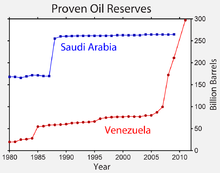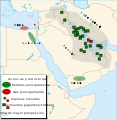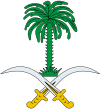- Oil reserves in Saudi Arabia
-
Proven oil reserves in Saudi Arabia are the second largest claimed in the world, estimated to be 267 billion barrels (42×109 m3) (Gbbl hereafter) including 2.5 Gbbl in the Saudi-Kuwaiti neutral zone. These reserves were the largest in the world until Venezuela announced they had increased their proven reserves to 297 Gbbl in January 2011.[1] The Saudi reserves are about one-fifth of the world's total conventional oil reserves, a large fraction of these reserves comes from a small number of very large oil fields, and past production amounts to 40% of the stated reserves.
Contents
Major oil fields
Although Saudi Arabia has around 100 major oil and gas fields, over half of its oil reserves are contained in only eight giant oil fields, including the Ghawar Field, the biggest oil field in the world with an estimated 70 Gbbl of remaining reserves. 90% of Saudi Arabia's oil production comes from five fields and up to 60% of its production comes from the Ghawar field.[2]
Production
Saudi Arabia produced 10.3 million barrels per day (1.6×106 m3/d) (Mbbl/d) in 1980, 10.6 Mbbl/d in 2006,[3] and in the region of 9.2 Mbbl/d in 2008.[4] Saudi Arabia maintains the world’s largest crude oil production capacity, estimated to be approx. 11 Mbbl/d at mid-year 2008 and announced plans to increase this capacity to 12.5 Mbbl/d by 2009[5] Cumulative production up to, and including, the year 2009 was 119.4 billion bbl.[6] Using the stated number of 296 Gbbl, past production amounts to 40% of the stated reserves.
After US President Bush asked the Saudis to raise production on a visit to Saudi Arabia in January 2008, and they declined, Bush questioned whether they had the ability to raise production any more.[7] In the summer of 2008, Saudi Arabia announced an increase in planned production of 500,000 barrels per day.[8] However, there are experts who believe Saudi oil production has already peaked or will do so in the near future.[3]
Data quality
Since 1982, the Saudis have withheld their well data and any detailed data on their reserves, giving outside experts no way to verify Saudi claims regarding the overall size of their reserves and output. This has caused some to question the current state of their oil fields. In a study discussed in Matthew Simmons's book Twilight in the Desert, 200 technical papers on Saudi reserves by the Society of Petroleum Engineers were analyzed to reach the conclusion that Saudi Arabia's oil production faces near term decline, and that it will not be able to consistently produce more than 2004 levels.[2] Simmons also argues that the Saudis may have irretrievably damaged their large oil fields by over-pumping salt water into the fields in an effort to maintain the fields' pressure and boost short term oil extraction amounts.
Diplomatic cables leaked during the United States diplomatic cables leak in 2011 revealed that Sadad al Husseini, the ex-head of Saudi Arabia's oil monopoly Aramco, warned the US that the oil reserves in Saudi Arabia might in fact be 40% lower than claimed (300bn barrels).[9][10]
Gallery
See also
- Energy in Saudi Arabia
- Saudi Arabian oil
References
- ^ Venezuela: Oil reserves surpasses Saudi Arabia's at english.ahram.org.eg
- ^ a b "New study raises doubts about Saudi oil reserves". Institute for the Analysis of Global Security. 2004-03-31. http://www.iags.org/n0331043.htm. Retrieved 2008-07-30.
- ^ a b Farsalas, Ken (2008-07-29). "No Speculation On Oil Reality". Forbes.com. http://www.forbes.com/finance/2008/07/29/carrizo-willbros-dawson-pf-ii-in_kf_0729soapbox_inl.html. Retrieved 2008-07-30.
- ^ "Petroleum (Oil) Production". International Petroleum Monthly (U.S. Energy Information Administration). April 2008. http://www.eia.doe.gov/ipm/supply.html. Retrieved 2008-05-14
- ^ "Saudi Arabia Oil Statistics". Country Analysis Briefs. US Energy Intelligence Administration. August 2008. http://www.eia.doe.gov/emeu/cabs/Saudi_Arabia/Oil.html. Retrieved 2008-08-15.
- ^ "Daily and Cumulative Crude Oil Production in OPEC Members". OPEC Annual Statistical Bulletin (OPEC). 2009. http://www.opec.org/library/Annual%20Statistical%20Bulletin/interactive/2009/FileZ/XL/T36.HTM. Retrieved 2009-02-22
- ^ Tverberg, Gail (2008-01-18). "President Bush Questions Saudi Ability to Raise Oil Supply". PRWeb. http://www.prweb.com/releases/peak/oil/prweb635891.htm. Retrieved 2008-02-01.
- ^ Penketh, Anne (2008-06-16). "Saudi King: 'We will pump more oil'". The Independent. http://www.independent.co.uk/news/world/middle-east/saudi-king-we-will-pump-more-oil-847830.html. Retrieved 2008-07-24.
- ^ John Vidal (9 February 2011). "WikiLeaks cables: Saudi Arabia cannot pump enough oil to keep a lid on prices". The Guardian. http://www.guardian.co.uk/business/2011/feb/08/saudi-oil-reserves-overstated-wikileaks. Retrieved 9 February 2011.
- ^ "Saudi oil reserves 'overstated'". Al Jazeera. 9 February 2011. http://english.aljazeera.net/video/middleeast/2011/02/201129171520279835.html. Retrieved 9 February 2011.
Oil reserves by country Listing List of countries by proven oil reservesCountries Categories:- Energy in Saudi Arabia
- Oil reserves by country
- Geology of Saudi Arabia
Wikimedia Foundation. 2010.






